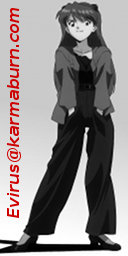|
|
Blog Archives:
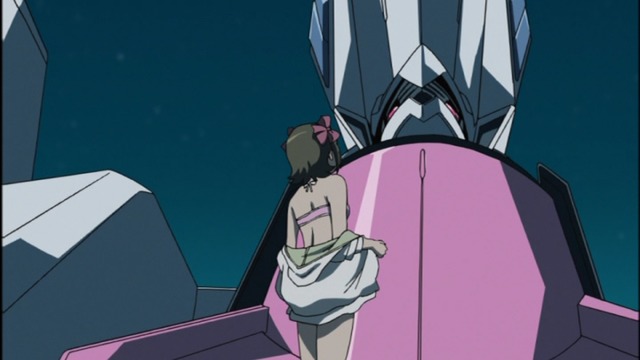
Shameless flirting.
I was a stranger to the iDOLM@STER franchise the first time I watched iDOLM@STER XENOGLOSSIA. I mentioned this before, but perhaps I should have noted I was also mystified by the amount of hostility displayed by some fans of the original games (arcade and Japanese Xbox 360 exclusive) toward Xenoglossia when the anime came out in 2007. Although I understood in principle the objections fans would have concerning the different character designs and replaced voices, I was not personally invested in any of the characters, so some of the more venomous attacks seemed excessive. Moreover, the character designs looked fine to me, at least relative to other anime of the period and Sunrise shows in particular. I finally watched my DVDs over the past few months, and actually enjoyed Xenoglossia a lot more on re-watch than I did during its initial broadcast, despite having a better understanding now of THE iDOLM@STER as a whole. Or maybe I like Xenoglossia more because I've watched several cours of bona fide iDOLM@STER anime now, not "despite" watching them.
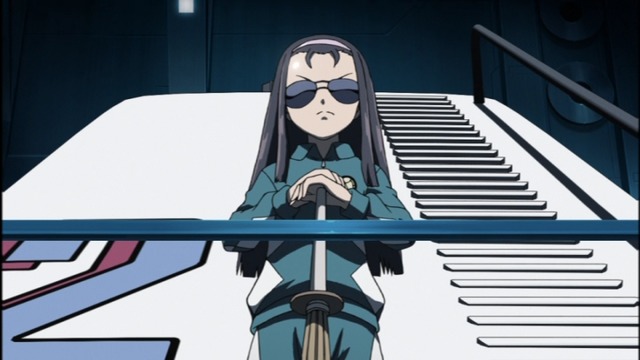
Yukarin Iori with purple hair is good too.
Still, I'm not quite sure how I would characterize iDOLM@STER XENOGLOSSIA. It's not really much of a giant robot show for a show about giant robots, and it's not an idol anime despite having (regular-type) idols and iDOLs in it. It's not a "cute girls doing cute things" show, nor is it an early example of the more recent phenomenon where anime girls band together to be really excited about some typically male-dominated activity, like Bakuon!! or Two Car or GIRLS und PANZER. Honestly, it really is a love story about a teenage girl and her much older robot boyfriend. Notably, the affection Haruka develops for Imber is not at all unusual, as all of the other pilots also develop complex feelings toward their robots as well. In fact, jealousy plays a huge role in the plot, as do the inevitable love triangles.
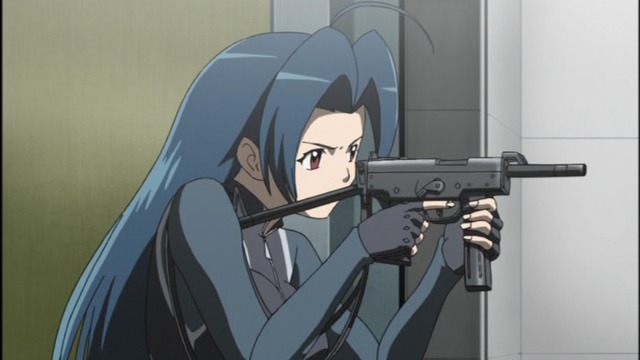
Also, Xenoglossia Azusa > regular Azusa.
IDOLM@STER XENOGLOSSIA does not take itself too seriously, but does not devolve into camp either. I buy into the HARUKA X IMBER pairing enough to believe there should be real questions raised about the ED once its setting becomes clear. I also enjoy the romance enough that I think I like the Xenoglossia Haruka more than I like the regular Haruka. Not that there's anything wrong with the regular Haruka necessarily, but I like the Xenoglossia Haruka's attitude better. Perhaps it's because she comes across as more of a main character in her own show, while the "real" Haruka necessarily seems more like a token default protagonist in a franchise with an ensemble cast, must the way I regard Miyafuji in Strike Witches or ol' Bucky in the Kantai Collection anime. I don't know if true fans of THE iDOLM@STER will ever regard Xenoglossia as positively as I do—the different voices must be especially jarring for them—but perhaps they'll come to appreciate the series if they think of it as one of those in-universe television programs the iM@S characters themselves occasionally feature in as actresses.
Posted in iDOLM@STER XENOGLOSSIA, iDOLM@STER, THE | Tags: 16-year-old love interests, Air Power, Built for Sin, DVDs and Blu-ray discs, Fan Service, Giant Robots, Idols, Love Confessions, Love Triangle, OP ED, Plying Girls, Re-Watching, Romance, Spoilers, Spring 2007, Summer 2007, Sunrise, Unrequited Love, Yui Horie | Permanent Link
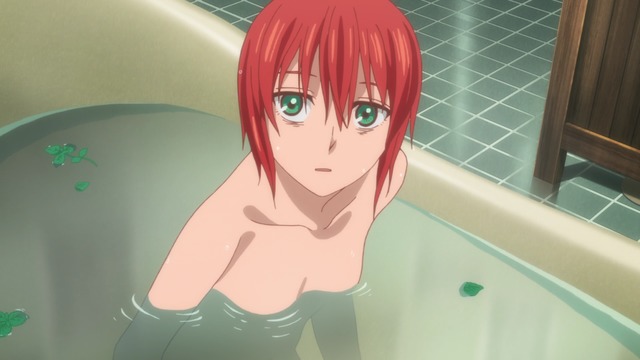
Chise in the bath in episode one.
The first anime season of Mahō Tsukai no Yome (The Ancient Magus' Bride) was visually stunning from start to finish. I had some doubts the show would be able to maintain the same high standard all the way through, but I've got no complaints about the first cours. The second cours has also started in fine form, but I'm still somewhat at a loss as to whether this is a show I would recommend or not. At a minimum, Mahoutsukai no Yome offers a different sort of anime that we rarely get. Even though Chise is Japanese, she practically could have come from anywhere, since the ethnic and cultural parts of her background don't matter so much as her early personal life and hardships. The setting is ostensibly British, but it's "Magical Cotswolds as a launching point to other realms" British and not, like, "chip shops on High Street" British.
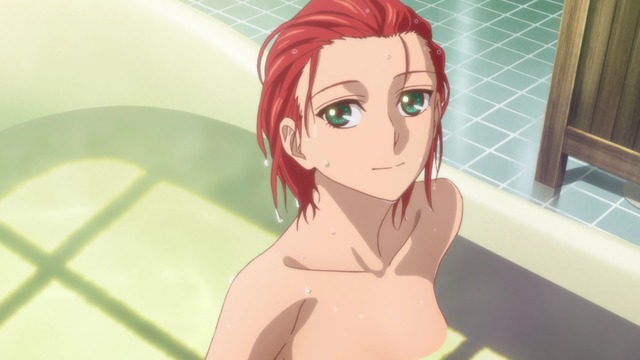
Chise in the bath in episode 12.
However, The Ancient Magus' Bride might be a little too consistent for its own good, in that there aren't a lot of dramatic highs or lows in the first half of the anime. I frankly have a difficult time imagining what the series must be like for someone who isn't already familiar with the manga. Would someone coming to the anime first be as impressed with it as I was with the manga? Rather than pursuing some objective which Chise strives toward each week, the series consists of seemingly unrelated stories that improve Chise's understanding of the magic world around her. There are occasional reminders that she'll face serious challenges ahead, but there's no corresponding sense of urgency. I have to admit it would be reasonable for viewers to simply dismiss Mahō Tsukai no Yome by saying, "It's fine, but not my sort of thing." Reasonable, but unfortunate.
Posted in Mahō Tsukai no Yome, Manga, RECOMMENDATIONS | Tags: 16-year-old love interests, Autumn 2017, Hair, Season Conclusion, Winter 2018 | Permanent Link
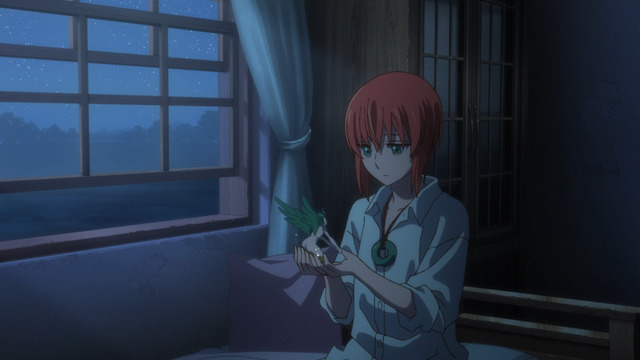
Arguably worse than mosquitoes.
The long-awaited anime adaptation of Mahō Tsukai no Yome (The Ancient Magus' Bride) is really here. Based on the first episode, Wit Studio is faithfully reproducing the look and feel of the magic realm (well, England, actually) where 15-year-old Chise finds herself. Although it's probably unrealistic to expect the standard set in the three prequel OVAs and the first episode to persist throughout the next two cours, I'm fairly confident Wit will be able to do the series justice. It's a gorgeous manga, so expectations for the anime are quite high. No pressure.
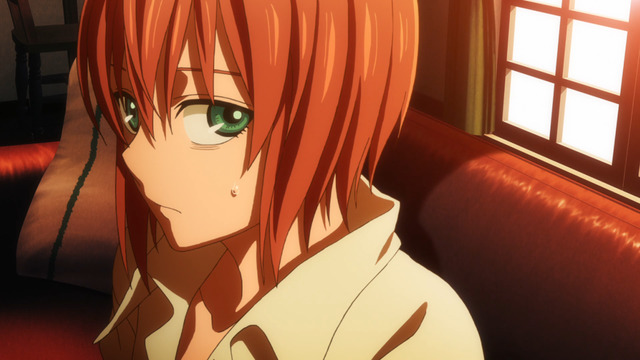
It's been a long day.
Despite the title, Mahoutsukai no Yome isn't really about a child bride, although the opening minutes of the anime (and the opening pages of the manga) are meant to invoke some troubling impressions. There are dark undercurrents in the series, but they're offset for the most part by the magic and splendor of the story and setting. I'm seven volumes deep into the English-language releases by Seven Seas Entertainment, so I've got a general idea where the anime is going to go. I'm still a bit uncertain how to promote it, since this isn't a title that relies on tremendous highs or emotional whirlwinds to keep readers interested. I suspect some of the complaints I saw about the OVAs' pacing will apply to the TV series as well, at least among some viewers. I'm by no means suggesting The Ancient Magus' Bride is for everyone, but it definitely deserves investigating for at least an episode or two. At a minimum, it's a stark rebuttal to the typical complaints people have about "anime these days."
Posted in Mahō Tsukai no Yome, Manga, RECOMMENDATIONS | Tags: 16-year-old love interests, Autumn 2017, Manga, May-December Romances, Romance, Season Introduction, Spoilers | Permanent Link
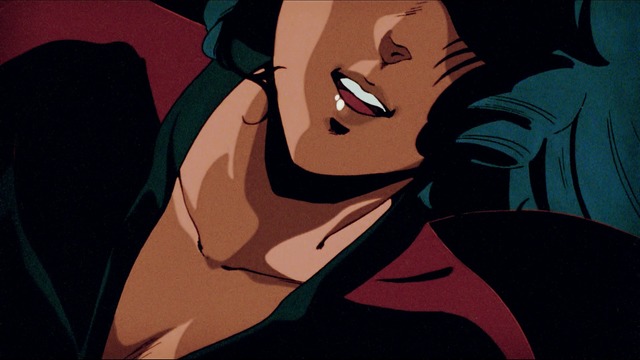
Hikaru-vision.
We've got a new Macross series now, and by the looks of it (through the first two episodes, at least), it seems to be pretty good. As a Macross fan, I'm glad to see the new series get positive attention, but this renewed interest is not without pitfalls. Some neophyte fans attempt to get a feel for the Macross universe by watching the Do You Remember Love? (Chō Jikū Yōsai Macross: Ai Oboete Imasu ka) movie before they watch the original series. Look, don't do that.
(more…)
Posted in Loot, Macross, Macross Δ, RECOMMENDATIONS | Tags: 16-year-old love interests, Giant Robots, Idols, Movies and OVAs, Season Introduction, Spring 2016 | Permanent Link
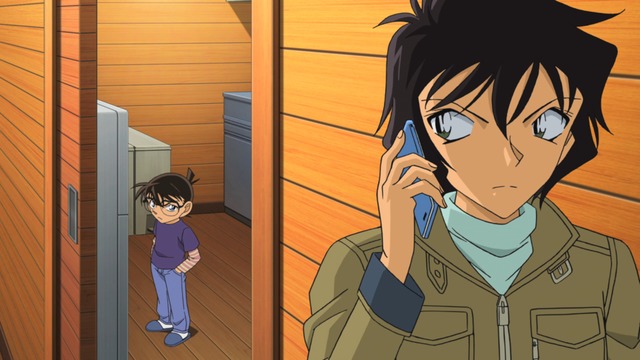
As if there is any chance in Hell of Sera turning out to be bad.
Because of "circumstances," I find myself dropping about half the shows I was following this season. Well, perhaps not so much dropping as putting on hiatus for the time being. Maybe I'll catch back up during a particularly lousy season that coincides with greater anime-watching opportunities. (Won't be next season, because next season looks pretty sweet.)
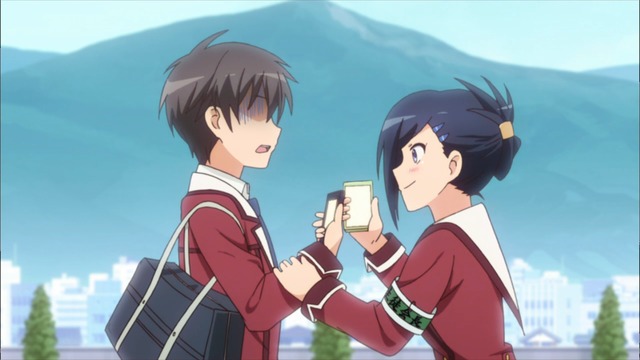
I'm pretty sure this is how cooties are transmitted.
I only started watching Inou-Battle wa Nichijou-kei no Naka de because of Studio Trigger. Thus far, it comes across as fairly unremarkable, although the basic setup is sort of amusing. This is no Little Witch Academia or Kill la Kill, so I'm left judging the show on its merits. It's fine, but the turbo-dere crazy girl was the only one I really liked. Since she's basically never in the show, what's the point? This is an easy one to put on hiatus, because I don't expect any spoilers down the road to ruin my chances of enjoying it. If it turns out to be a stinker, then I'll have dodged a bullet by ducking out early now.
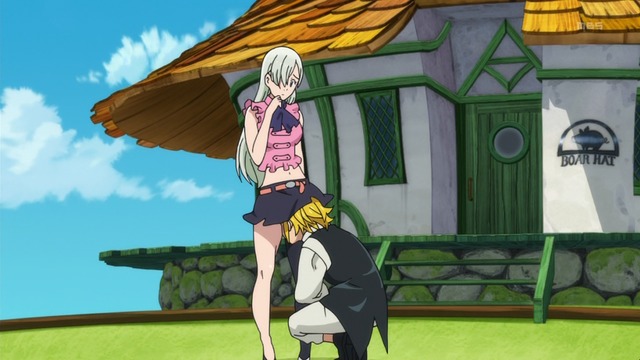
Succor.
As much as I enjoy watching a runty old man brazenly fondle a nubile, 16-year-old princess who suffers from poor depth perception, I'm dropping Nanatsu no Taizai because I'm already reading the manga. There are currently more than 100 chapters out, making it a cinch that even a two-cour show will just trail off at some convenient stopping point without resolving anything. The anime adaptation is pretty good, and the fights have been entertaining, but I need to clear up some room in the ol' anime block.
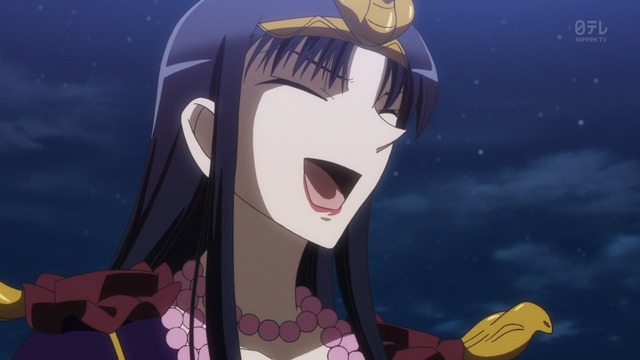
Oh ho ho.
I'm putting both Magic Kaito 1412 and Detective Conan on hold. I consider Magic Kaito to sort of be a Detective Conan property anyway, even though that's not technically accurate, and I've got a huge backlog of Conan episodes numbering into the hundreds, so it's easy to set both shows on back burners. Really, most of y'all should probably be watching both of these shows. It just goes to show that "nobody watches shows if they're really popular."
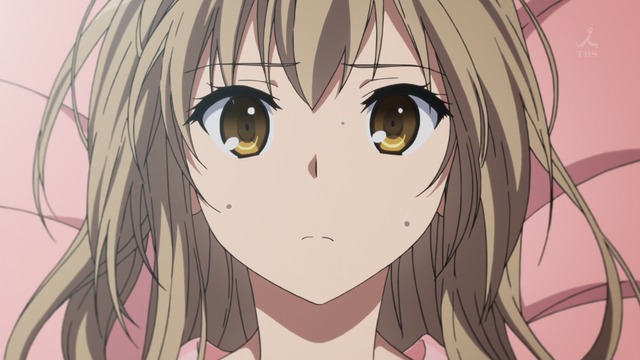
Bad dream?
I haven't been enjoying Amagi Brilliant Park nearly as much as most viewers, largely because the current flavor to Kyoto Animation's work doesn't quite agree with me. That said, I have enjoyed it more than Hyouka (which I think most viewers would describe as vastly superior), and I've definitely liked it more than the episodes of Chuunibyou demo Koi ga Shitai! that I watched. (I skipped Kyoukai no Kanata, Free!, and Tamako Market entirely.) Kyoto Animation is very good at what they do, and I can tell the original light novel probably would have fared much worse had it been adapted by most other studios. Nevertheless, I can't ultimately care too much about the show and was mostly watching for Ayako. 50 Cent was pretty good until the series decided she needed to fall in love with Kanye West. The dude simply isn't charismatic enough to get me to care about this relationship angle. Even if he is at least better than the typical Potato-kun, that's a low standard to reach.
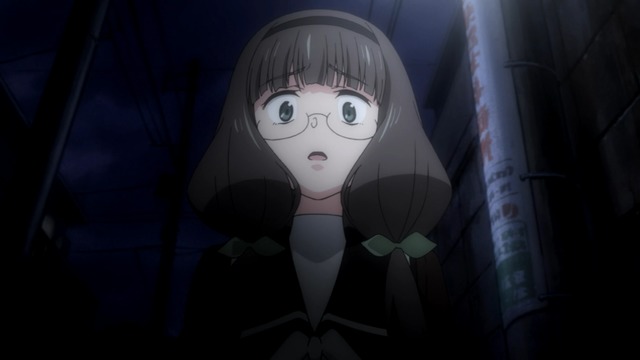
I'm pretty sure the entire thing is Hitoe's fault somehow.
I will definitely undrop selector spread WIXOSS at some point (providing it doesn't get another season). I intend to follow this suffering to the end (of this cour anyway), even though I basically get no enjoyment out of the show anymore. These are broken characters stumbling their way through an asinine situation for implausible reasons. I'm mostly just waiting to see if Akira is going to kill somebody before Hanayo gets pregnant. She is going to get pregnant and spawn stupid playing card babies, right? Oh, like you have a better reason to watch this show.
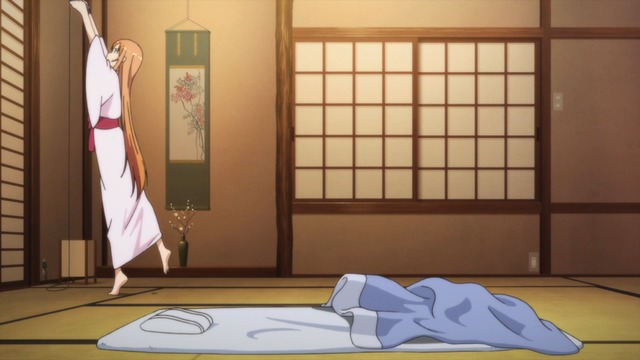
The Lion King.
I was going to pause Sword Art Online 2 because I've read the Mother's Rosario arc and already know what happens. Still, this arc should be about as good as Sword Art Online ever gets, so I might as well keep watching. I'm not sure how standard (read: Kirito) fans will react to the Asuna-led focus of these remaining episodes, but I hope they at least enjoy these episodes more than they like the second half of the first season. (You know, the one where Asuna spent all of her time sitting in a chair and waiting to be rescued when she wasn't too busy being sexually assaulted.) Unfortunately for people watching the anime, there are spoilers for this arc that will be difficult to avoid because they're of the variety that detractors of Sword Art Online won't be able to resist revealing.
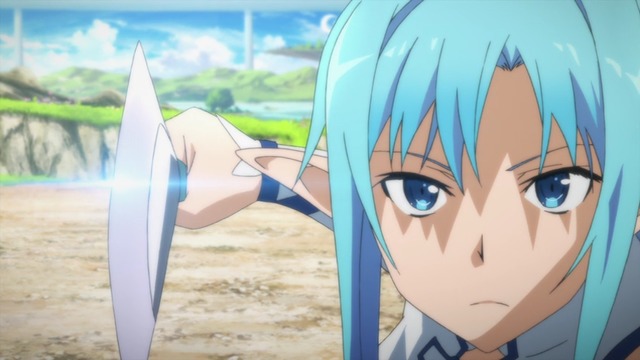
Aim for the face.
Actually, there's a good chance I'll place Sword Art Online 2 on hiatus anyway.
P.S. Asuna dies.
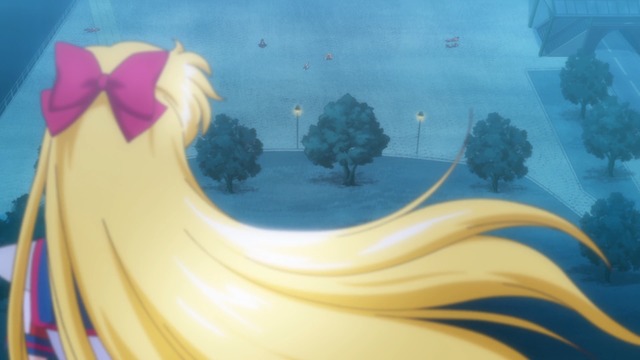
That is totally the Sailor V costume from the back...
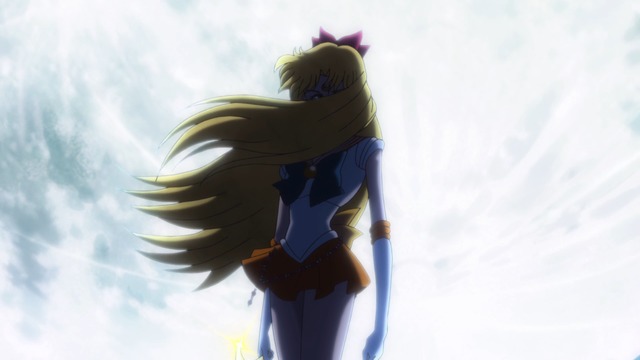
...but it changes to the Sailor Venus battle
costume when we see it from the front.
Bishoujo Senshi Sailor Moon Crystal was an easy one to put on hold because it only airs every two weeks and because I frankly don't like it. I like the idea of Sailor Moon, but I can't claim to particularly enjoy the manga, the 90-some episodes of the original anime that I've watched, or the Crystal Bullshit episodes of the remake that I've seen so far. With Chibi Usa about to make her appearance, this was a no-brainer. I still haven't officially dropped it (or the original anime, for that matter), since I feel I should watch the entire thing as a matter of principle, but it is a slog.
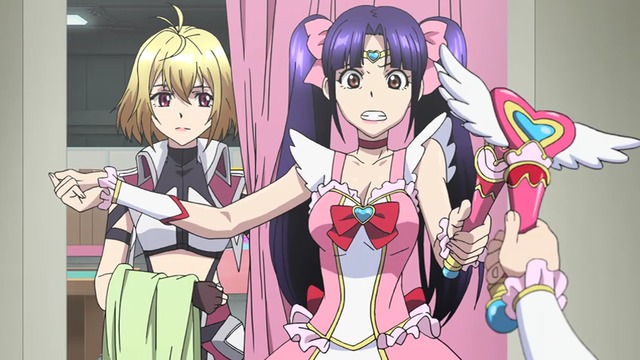
Busted. P.S. Spoilers.
You know what show I'm not putting on hold? Motherlovin' Cross Ange. This is some good shit, yo. Week after week of solid entertainment. Two cours, baby!
Posted in Amagi Brilliant Park, Bishoujo Senshi Sailor Moon Crystal, Cross Ange: Tenshi to Ryū no Rondo, Detective Conan, Inou-Battle wa Nichijou-kei no Naka de, Magic Kaito, Nanatsu no Taizai, selector spread WIXOSS, Sword Art Online | Tags: 16-year-old love interests, Air Power, Autumn 2014, AYAKO DOCTRINE, Banana Mizuki, Detectives, Dropped Shows, Fan Service, Girls With Guns, Harem Comedy, Haruka Tomatsu, J.C. Staff, Kyoto Animation, Legs that go up to her neck, Mahou Shoujo, Manga, May-December Romances, Plying Girls, Rape, Season Introduction, Shounen Jive, Spoilers, Studio Trigger, Superlovely Character Designs | Permanent Link
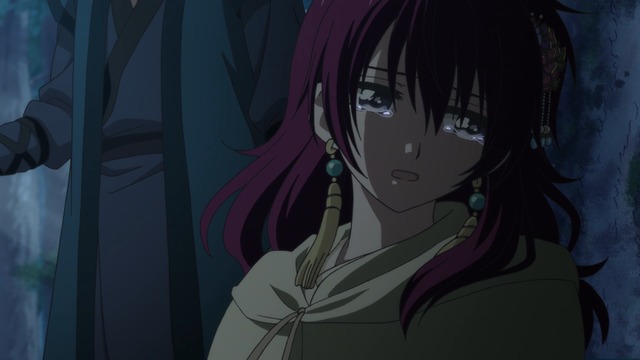
It ain't easy being a princess these days.
I'm watching two shows this season with fairly similar basic plots. The teenage princesses in Akatsuki no Yona and Nanatsu no Taizai are both assembling teams of skillful warriors in order to defeat usurpers. That's about it with regard to their similarities, though. The remainder of this blog entry deals with themes and elements found in the source material for both anime. Although I'll avoid explicit spoilers, readers who wish to avoid learning anything in advance about either of these shows should probably just stop reading and watch both anime to develop their own comparisons. They've got princesses gettin' the band back together! Give 'em a shot!
(more…)
Posted in Akatsuki no Yona, Nanatsu no Taizai | Tags: 16-year-old love interests, Autumn 2014, Compare and Contrast, Fan Service, Manga, May-December Romances, Season Introduction, Shoujo, Shounen Jive, Spoilers | Permanent Link
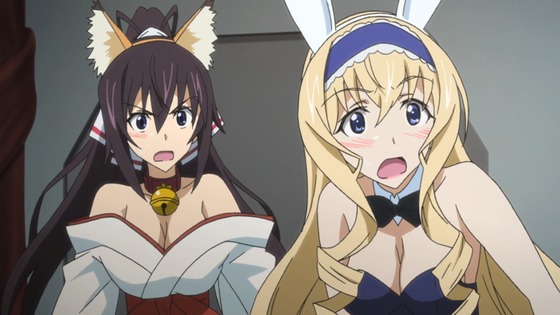
I don't remember why the ears were necessary.
As sequels go, IS Infinite Stratos 2 plays it pretty safe, offering mostly filler around a fairly uninteresting plot. It knows its bread and butter involves inspiring (somewhat facetious) arguments about the relative merits of the bevy of girls surrounding Potato-kun as he fails again and again to notice his harem's interest in him.
(more…)
Posted in IS Infinite Stratos 2 | Tags: 16-year-old love interests, Autumn 2013, Hanazawa Kana, Harem Comedy, Love Triangle, Superlovely Character Designs, tsundere, Unrequited Love, Yukana | Permanent Link
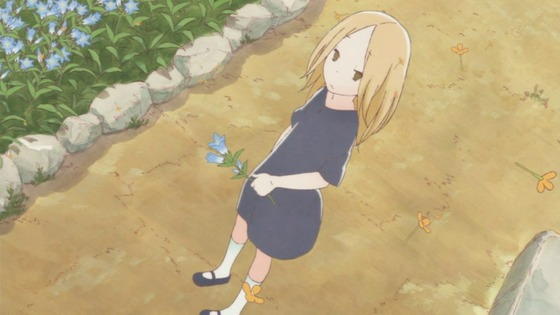
Daikichi's first impression of Rin is a recurring image.
Usagi Drop was one of the best shows from summer 2011, losing the top spot in my rankings only because of its brief 11-episode length. However, based on the outcry the original manga created, the anime's short run was its saving grace, due to the unspeakable horror of the manga's conclusion. Or so it goes.
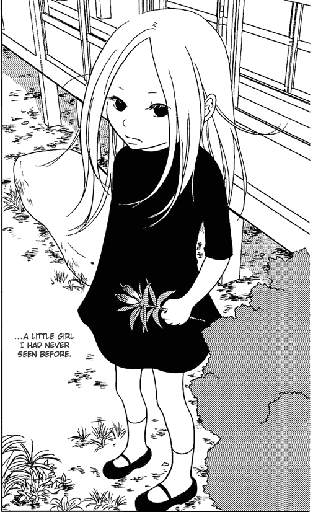
Daikichi sees Rin for the first time, manga version.
I've long learned of the otaku penchant for gross overreaction, so I took the time to read the entire manga myself—something I suspected many of its critics neglected to do. Based on my findings, I can understand why so many otaku reacted the way they did, but I personally had no issues with the manga's ending myself, possibly because I'm much less critical of anime and manga in general; I at least try not to group things into only two categories—AWESOME and HORRIBLE—there is a lot of stuff in that middle ground I enjoy, even if I don't necessarily enjoy all of it.
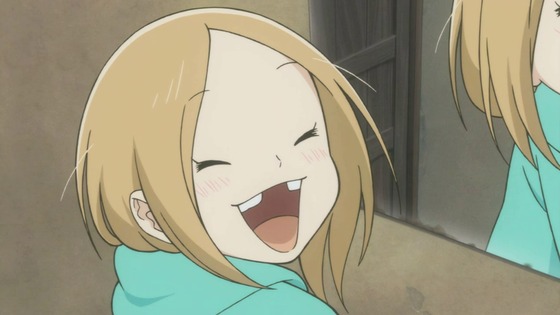
Here, the Usagi Drop anime ends.
The 11 Usagi Drop anime episodes duplicate the first 25 chapters of the 56-chapter manga almost scene for scene. The anime is very faithful to the source material. The anime also ends where it does because of the manga's timeskip. That's right, more than half of the Usagi Drop story occurs after the timeskip, so arguably the latter half is the "real" story which the first part merely sets up. At a minimum, a truculent reader should at least grudgingly acknowledge the second half is intended to be as important as the first half.
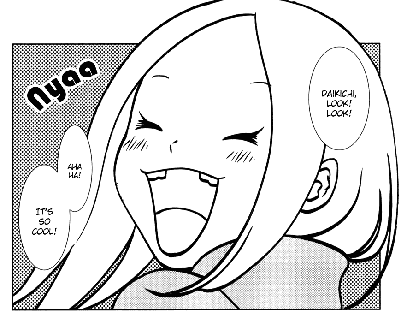
Here, the Usagi Drop manga is merely beginning.
Spoiler Warning: I won't explicitly discuss the manga events, but most readers will probably be able to easily guess the spoilers from context with little effort. When I first heard about the post-timeskip outrage, I compiled a mental list of likely spoilers based on what I knew about otaku and what I knew about Japan and what I had seen in other anime and manga. Sure enough, this list of possible rage-inducing outcomes included two of the spoilers that actually occurred in the manga, although to be fair, I was incorrect about a material detail about one of them and the one I was 100% correct on was the one I had already intuited from a scene in the anime before I had even heard about the entire controversy.
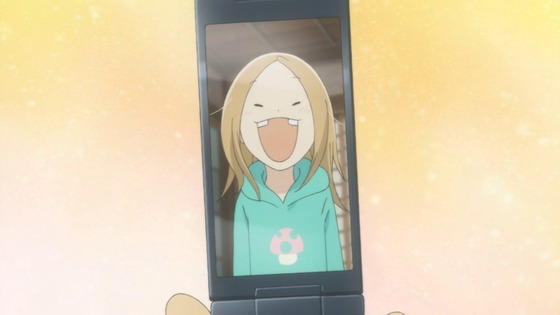
Rin shows off her missing teeth.
So why so much hostility towards the manga's ending? Frankly, I attribute it to one (or both) of two reasons. One, otaku might not be exposed to much western literature and theater if they spend most of their free time voraciously consuming manga and anime. Thus, their expectations as to what is appropriate or acceptable follow different conventions. Two, these conventions themselves are tailored in self-perpetuating otaku-friendly ways to be non-threatening. Yeah, most people angered by the Kannagi ex-boyfriend revelation were joking, but notice how none of the K-On! girls are permitted boyfriends either; even a supporting character requires plausible deniability—even in jest—when she is shown with a possible beau. This is not to say that strangers to manga and anime would not revile the Usagi Drop manga ending, but it's possible those with greater exposure to a variety of "acceptable" endings may give the title more latitude because they are more liberal with their expectations. Expectations are probably key here. For example, because its audience has different expectations, nobody bats an eye when Oedipus has sex with his mother and later puts out his eyes, and nobody cares when a Shakespeare tragedy concludes with a half-dozen dead bodies on the stage. And how many readers of the popular A Song of Ice and Fire fantasy novels are offended by all the rape, incest, and teenage brides?
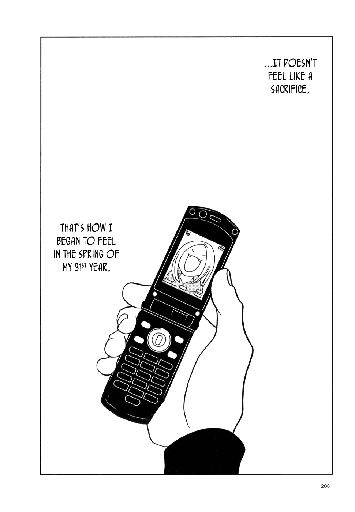
Tiny pictures are the way of love.
I do not claim it is improper for manga and anime fans to hold different expectations for these works, but I do feel that those embracing narrower allowances contribute to the apparently collective overreaction to the Usagi Drop ending. And I do think they overreacted, especially the ones who were offended by second- or third-hand reports about how it played out instead of investigating the matter themselves. I can understand not wanting to "stain" a cherished impression created by the first half of the story, but someone forcing himself to look away to avoid something he's predetermined to condemn as distasteful strikes me as amusingly immature.
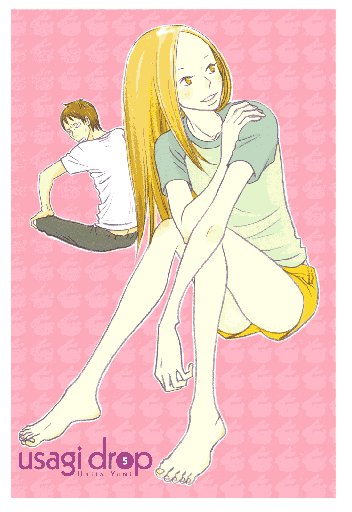
I forgot to mention timeskip Rin has legs that go up to her neck.
Yes, it turns out most of Usagi Drop is a teen drama, but it's not a bad teen drama unless you claim all teen dramas are bad as a matter of general principle. Guess what? After the timeskip, Rin is a teenage girl. And, like I said, since there are more chapters with Rin as a teenager than there are of Rin as a small child, Usagi Drop arguably is a teen drama. And it's not one of those teen dramas where nothing happens. There's kissing! There's sex! There's pregnancy! But there is also devotion and unrequited love.
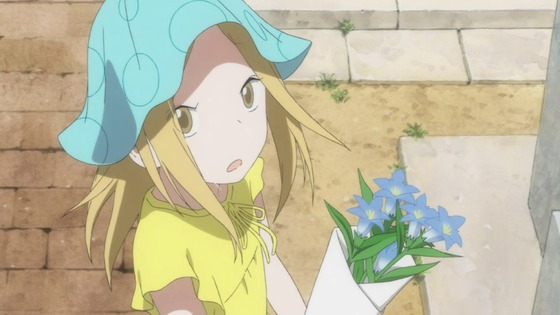
Rin pays her respects.
Frankly, none of this would even be possible were it not for two key elements established in the first half. First, Rin explicitly rejects Daikichi as a father when he broaches the subject. Second, six-year-old Rin is the sweetest, nicest, most well-mannered little girl in history, so Daikichi's parenting—as far as we are shown—consists almost entirely of having a job and being able to sign contracts. Instruction and discipline? Not so much.
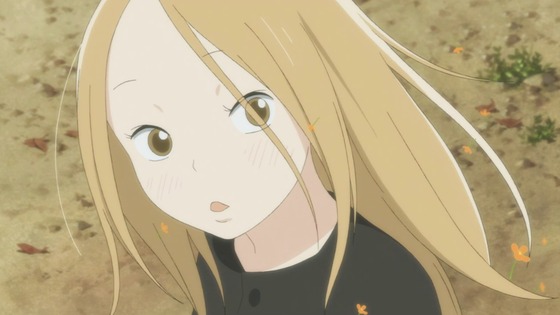
Daikichi remembers how he met Rin.
We also don't see much parenting with regard to Kouki. We know he needed more of it, since he was apparently quite a hellion, but Usagi Drop omits a lot of details. There are at least three really big incidents that occurred between the two arcs, but aside from oblique references to them, the reader remains entirely ignorant as to, you know, what happened.
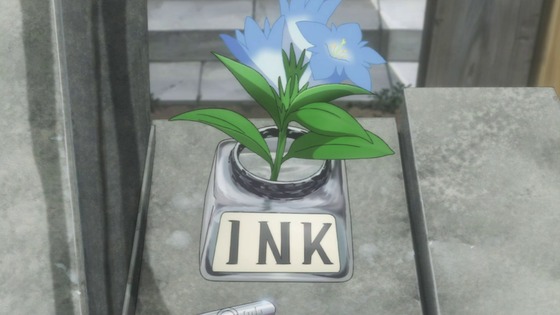
Rin's mother pays her respects.
I've probably said too much already, and if you can't figure out what the big deal is by now, you probably either don't know anything about Usagi Drop to begin with, or you weren't paying attention. If you have figured it out and still refuse to read the manga yourself because you're afraid of tarnishing the image formed by the anime, at least consider this: The first half of Usagi Drop is told from Daikichi's point of view. The second half is from Rin's and Kouki's points of view. This change is what makes the ending work for me.
Posted in Manga, RECOMMENDATIONS, Usagi Drop | Tags: 16-year-old love interests, Childhood Friend, Legs that go up to her neck, Manga, Shoujo, Summer 2011, Tiny Pictures Are the Way of Love, Unrequited Love | Permanent Link
|
|





